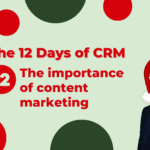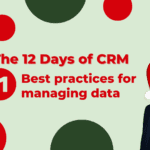Five Effective Ways to Clean Up Your CRM Data

We hear a lot of buzz about big data, but what we really need isn’t more data – it’s better data. Research shows that up to 30% of our key CRM and other data degrades each year as people get hired, fired, promoted and change jobs, move and change addresses, get married and divorced, retire and even die.
At the same time businesses are opening and closing, merging and being acquired, moving and relocating. Without our constant attention, all this can add up to a huge pile of data that is missing or mistaken, duplicative or dated, incorrect or incomplete.
These data issues can be particularly problematic in professional services where, probably more than any other industry, being able to communicate effectively with clients and prospects is essential.
Firms need to be able to share information from and about their experience and professionals to successfully communicate, market and develop business. Professionals also spend a lot of valuable (billable) time writing and speaking, and if their messages don’t reach the right audiences, this time (and money) is wasted.
But in law firms, data quality issues can be compounded.
Busy professionals don’t always have the time to pay adequate attention to contact data because of other responsibilities.
In addition, for lawyers time is money – literally, so any drain on time can also be a financial drain.
Consider the inefficiency of having multiple or even hundreds of professionals who bill time at hundreds or upwards of $1000 an hour, regularly reviewing the same bad lists of combined contacts. Bad lists also lead to bounces, which limit the firm’s ability to reach key audiences. Plus, if the bounce rate on an e-marketing campaign is high enough, the firm’s email domain can get labeled as spam, causing the firm to be blacklisted by key companies.
Bad data can also cause technology issues. If the attorneys don’t trust the data, by default, they often won’t trust – or use – the CRM. And while bad data is problematic enough on its own, consider what happens when we throw in (literally) multiple data sets by integrating other software or systems.
Dealing with Dirty Data
So, what is the best way for a firm to deal with bad data? Based on more than a decade of experience working together with hundreds of top firms on CRM and data quality projects, here are some tips for identifying data quality issues and preventing future problems.
1 – Assess
Start by taking a minute to assess the mess and come up with answers to a few important questions to help you to scope the situation:
- How much bad data do we have?
- Where is it located?
- How did it get there?
- Who is in charge of it?
- What is it costing us?
- What is the best way to clean it up?
- Who will assist with data cleaning?
- How long will the cleanup take?
- How much will the cleanup cost?
2 – Plan
It’s helpful to start with a cost-benefit assessment to help determine the best way to proceed with cleanup. For instance, if you have a significant amount of bad data, it may be more efficient to start with an automated data cleaning and appending option. This can help to improve and enhance a large amount of data in a short amount of time and can be quite cost-effective. But it’s important to note that an old adage applies to data quality projects: you can have quick, cheap or good – pick any two. So, after any automated data quality process, always take time to analyze the results because they won’t be perfect. But also remember in law firms sometimes perfect can be the enemy of good. For some data sets, good may actually be good enough.
3 – Data Stewarding
If you still have a lot of bad data remaining that is important, like top client information, or if you happen to work in an organization that can be a little fanatical about data quality (we all do), then you will want to move forward with manual data stewarding to research, clean and append missing information to the remaining records. Additionally, because law firms need good reliable data going forward, ongoing data stewarding will be essential and can assist with data cleaning. This can be accomplished by internal or outsourced data quality resources.
4 – Data Sources
Identify any other sources of bad data that are compounding contact problems. For instance, if there are existing integrations that are creating duplicates or overriding good data with bad, determine how valuable this data is. If it’s critical, find a way to work together with other departments on a solution.
5 – Technology
Use software to make data quality more efficient and effective. One tool that can be particularly effective is an Enterprise Relationship Management (ERM) system. This software not only creates contacts from the signature blocks of emails, which is important because a lot of busy lawyers no longer take time to create contacts records, but it can also be used to validate and fill in missing information on existing records, which means less time researching.
While it’s easy to become overwhelmed by dirty data, what’s important is to put it in perspective. Focus on discreet data and projects that yield real ROI such as:
- Start with your most relevant records like current clients. Begin cleaning your top 100 to 500 along with associated key contacts.
- Review frequently used lists to ensure your communications and invitations are reaching the right recipients.
- Vet bounced emails after each campaign, or better yet, regularly run lists through an automated data process to identify bad emails before a campaign to ensure that information actually reaches your targets in a timely manner.
- Tackle time-sensitive one-off projects. For instance, an upcoming event often provides a good opportunity to get users engaged in cleanup efforts, particularly if the event is important to them.
It’s also important to remember that because data degrades so rapidly, data cleaning can’t be a one-time initiative. Successful data quality projects never really end. The good news is that this means we have forever to get better at data quality! Contact us if you need help with your data quality needs.
For more than a decade, the team at CLIENTSFirst Consulting has been helping professional services firms and other organizations successfully select and implement CRM and e-marketing systems and improve data quality to maximize value, adoption and return on investment. If you need help achieving CRM Success, contact us at 404-249-9914 or Info@ClientsFirstConsulting.com.






